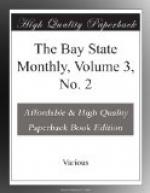On such fictitious incidents in the romances of past ages, Shakespeare undoubtedly built many of his dramas. The story of Shylock in the Merchant of Venice is found in an old English ballad. I will quote a few stanzas to indicate the identity of Shylock and “Germutus, the Jew of Venice.”
The bloudie Jew now ready is
With whetted blade in hand
To spoyle the bloud of innocent,
By forfeit of his bond,
And as he was about to strike
In him the deadly blow;
Stay, quoth the judge, thy crueltie
I charge thee to do so.
Sith needs thou wilt thy forfeit have
Which is of flesh a pound;
See that thou shed no drop of bloud
Nor yet the man confound
For if thou do, like murderer
Thou here shall hanged be;
Likewise of flesh see that thou cut
No more than longs to thee;
For if thou take either more or lesse
To the value of a mite
Thou shall be hanged presently
As is both law and right.
It is reasonable to suppose the miser thereupon departed cursing the law and leaving the merchant alive.
There is, also, a famous ballad called “King Leir and His Daughters,” which embodies the story of Shakespeare’s tragedy of Lear. It commences thus:
So on a time it pleased the king
A question thus to move,
Which of his daughters to his grace
Could show the dearest love;
For to my age you bring content,
Quoth he, then let me hear,
Which of you three in plighted troth
The kindest will appear.
To whom the eldest thus began;
Dear father, mind, quoth she
Before your face to do you good,
My blood shall render’d
be:
And for your sake, my bleeding heart
Shall here be cut in twain
Ere that I see your reverend age
The smallest grief sustain.
And so wilt I the second said;
Dear father for your sake
The worst of all extremities
I’ll gently undertake.
And serve your highness night and day
With diligence and love;
That sweet content and quietness
Discomforts may remove.
In doing so you glad my soul
The aged king replied:
But what sayst thou my youngest girl
How is thy love ally’d?
My love quoth young Cordelia then
Which to your grace I owe
Shall be the duty of a child
And that is all I’ll
show.
This honest pledge the King despised and banished Cordelia. The ballad accords with the drama in the catastrophe. Both have the same moral and the same characters. The ballad is doubtless the earlier form of the story. Possibly the minstrel and dramatist may have borrowed from a common source. Good thoughts, good tales and noble deeds, like well-worn coins, sometimes lose their date and must be estimated by weight. Ballad poetry is written in various measures and with diverse feet. The rhythm is




